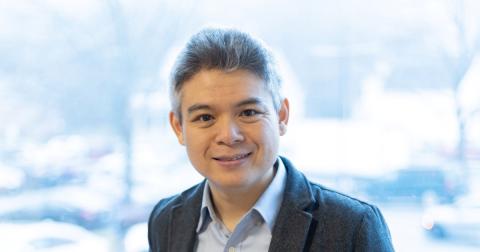Professor Chen Wu

One of the definitions of economics is the study of scarcity, how people use resources, and how they respond to incentives.
When professor Chen Wu decided to make changes to Plymouth State University’s online master’s of business administration (MBA) degree to a one-year cohort model, he used all three of those factors in suggesting the new offering.
“I saw a demand from students wanting to be on campus and they loved the in-person environment,” Wu says. “The online MBA market is saturated. All of the schools are offering it. One way to make the program stand out is to utilize the resources we have on campus and offer an intense and shortened program that gives our students a head start in their job careers. The one-year cohort filled the gaps. Students prefer to learn in a cohort environment where they benefit from each other’s different academic backgrounds. Their cohort fellows are also valuable to network even after they graduate.”
It is not surprising the associate professor of economics and director of business graduate programs would think of it in this way, as he lives and breathes economics.
“He is just so passionate about economics and the MBA program,” says Jessica Mezquita ’22, ’23MBA who took Economics Analysis with Wu. “He let me know going in that he is going to make sure I have what I need to succeed in this program. If a teacher is passionate about the subject, then the students will be, too.”
Hanna Larsson Nathhorst ‘26, a psychology major from Sweden, enjoys the manner in which Wu runs his classes.
“Before every class he gives us his notes we will be working from that have links to articles, so we have a good understanding of what he wants to teach,” she says. “This is not what I am used to in other classes. Others are lectures, Wu’s class is more like a seminar. He wants us to be included in the discussion. He wants us to participate.”
Wu, whose other popular courses are Principles of Economics and Intermediate Microeconomics, joined the PSU faculty in 2013 after teaching for one year at Colgate University, his first job in the United States. He had come to America from his native China in 2007 to earn his PhD at the University of Oklahoma.
The move to a small state—one where he felt he could get involved easier than bigger ones like New York and Oklahoma—helped spur his interest in foreign direct investment (FDI), which is foreign business that is done in the United States. He has gotten so knowledgeable and invested in FDI that he and PSU colleague Roxana Wright co-author the annual New Hampshire Foreign Direct Investment Report, which delves into foreign involvement and investment in the Granite State.
“Before 2016 I used to contribute to my academic field by being published in peer review journals,” Wu says. “Then I got the idea that I live in a small state so there should be an opportunity to do something for the state. The people in New Hampshire’s Division of Economic Development were approachable.”
Wu knew of some aspects of FDI but not how it affects New Hampshire. In Wu and Wright’s 2021–2022 NH FDI Report, which will come out this February, around 180 foreign companies headquartered in 23 countries currently have nearly 400 subsidiaries operating in 50 industries of the state’s economy. In 2020, the foreign subsidiaries supported approximately eight percent (or 50,700 members) of the state’s overall private-sector employment, higher than the national average of six percent.
“Our research is important,” Wu continues. “We are role models as researchers who work in a typical public university. It is because of our research that we can use our data to help local policymakers.”
Wu’s interest in economics and FDI has also led him to still being published in journals as well as being invited to be a speaker at a variety of conferences, further expanding his and the school’s brand.
“Chen is very hard-working, dedicated, and motivated in anything he does,” Mezquita adds. “And that is what makes him a great professor, advisor, and director for all of us. It gives us a good leader to look up to.”

